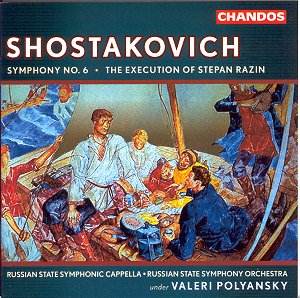Still standing in the deep shadow of the Fifth Symphony
when it comes to popularity (and hence numbers of both performances
and recordings), the Sixth Symphony poses a number of challenges, both
to interpreters and listeners. After the clear four-movement structure
of the Fifth, here is a three-movement symphony with a first movement
that lasts longer than the other two combined.
The Sixth seems to stand between the twin peaks of
the Fifth and Seventh Symphonies, therefore: but this is no ‘slender
Grecian maid’ like Beethoven’s Fourth standing between the mighty Eroica
and his Fifth. It stands very much on its own two feet. As in
much of Shostakovich’s output the extremes of vulgarity and true emotional
depth coexist in a way which mirrors ‘real’ life. Any performance worth
its asking price cannot and must not shy away from these seemingly opposed
sides of Shostakovich’s persona.
Let it be stated from the start that Polyansky’s account
is technically excellent: the Russian State Symphony Orchestra is a
superb ensemble, evidently finely honed by its conductor (Polyansky
has conducted them since 1992). The recording is fully up to Chandos’
standards (as Polyansky himself is listed as producer, one can assume
that we hear exactly what he wants us to hear). The prevailing seriousness
of intent is clear from the meaty, determined initial statement which
launches the twenty-minute journey of the first movement. Polyansky
is a reliable guide, ever attentive to the felicities of Shostakovich’s
scoring and fully able to summon up hushed stillness when required.
This first movement is Polyansky’s greatest achievement, for in the
other two movements (6’23 and 7’09 respectively) there appears a feeling
of restraint, which undersells the piece. This is less marked in the
second movement (allegro) than in the finale. Even though there is a
playful element in the playing of the last movement, there is also room
for some unashamed vulgarity (particularly near the close). Perhaps
this would have been more forthcoming if the recording had been live?
Try Mravinsky and the Leningrad Philharmonic on Le Chant du Monde PR7254017
coupled with the Twelfth to get closer to the heart of this enigmatic
masterpiece.
The even rarer-heard Execution of Stepan Razin
of 1964 is a valuable and fascinating ‘filler’ (inverted commas as it
takes up nearly half of the total playing time). Originally intended
as the first movement of a symphony (along the lines of the Thirteenth,
and sharing with that piece the poet, Yevtushenko), it tells the story
of Razin, who unsuccessfully tried to lead a rising against the Tsar
in the seventeenth century. It is in essence a story of defiance in
the face of authority, a defiance taken right through death as a post-death
Razin successfully mocks the Tsar. Listening to the score, it is clear
that the text made a deep impression on the composer. Shostakovich’s
legendary gift for orchestration means that the piece is powerfully
evocative, and the choral writing gives the excellent Russian State
Symphonic Cappella the chance to shine (and shine they do). There are
even echoes of Stravinsky’s Les Noces (1914-17) in some of the
choral passages. Anatoly Lochak, a soloist with the Bolshoi Theatre,
Moscow as well as ‘permanent guest’ at Wexford, projects and characterises
to the manner born. The disc is worth its price for Op. 119 alone.
Colin Clarke


